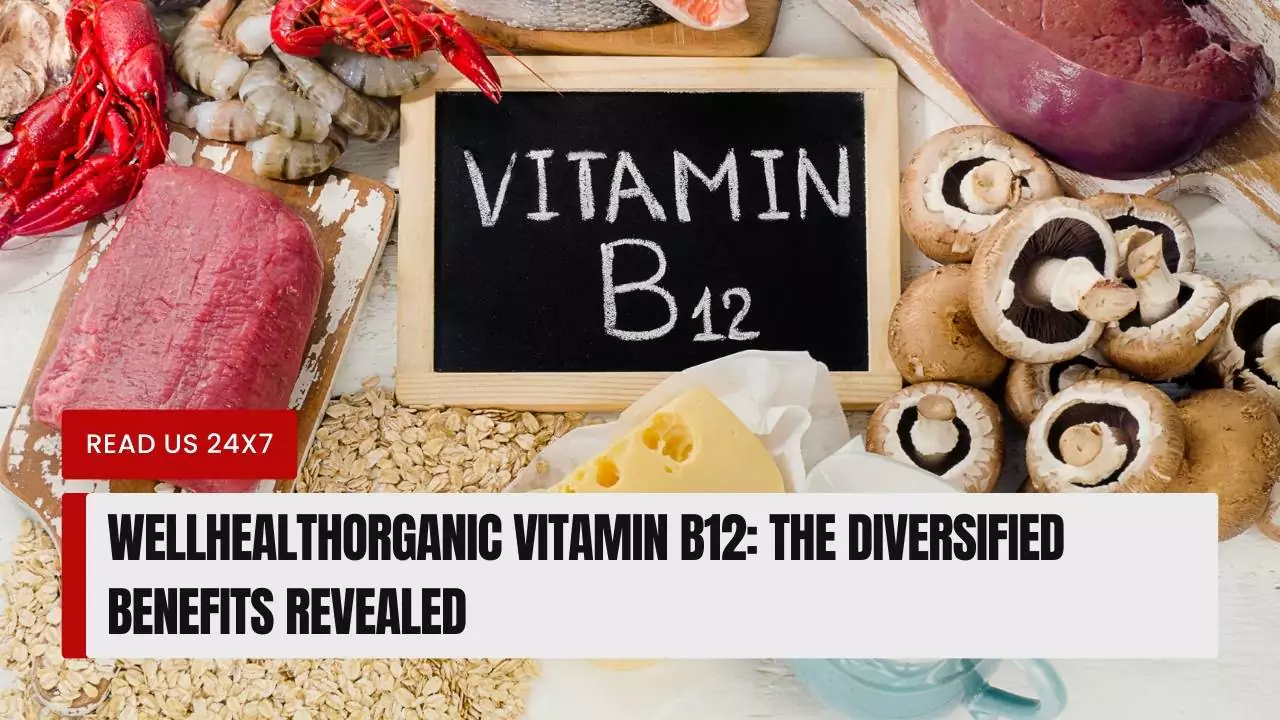Vitamin B12 is a vital nutrient that supports many functions in your body, from cell regeneration to blood circulation. However, not all sources of vitamin B12 are equal, and some people may have trouble absorbing it from their diet. That’s why Wellhealthorganic Vitamin B12 is a great choice for anyone who wants to boost their health and well-being. This article will explain what vitamin B12 is, how it benefits your body, and how you can incorporate it into your daily routine.
Understanding Vitamin B12
Vitamin B12, also known as cobalamin, is a water-soluble vitamin that contains the mineral cobalt. It has a complex chemical structure that consists of a corrin ring with a central cobalt atom and various side chains. Vitamin B12 can exist in different forms, depending on the type of molecule attached to the cobalt atom. These forms include methylcobalamin, adenosylcobalamin, hydroxocobalamin, and cyanocobalamin.
Vitamin B12 is not produced by plants or animals but by certain bacteria and archaea. These microorganisms synthesize vitamin B12 through a series of enzymatic reactions that involve different precursors and cofactors. The biosynthesis of vitamin B12 is a highly regulated process that depends on the availability of substrates and environmental conditions.
Vitamin B12 is naturally found in animal products, such as meat, eggs, dairy, fish, and shellfish. These foods contain vitamin B12 bound to proteins, which need to be released by digestive enzymes and stomach acid before they can be absorbed. The free vitamin B12 then binds to a protein called intrinsic factor, which is secreted by the stomach. This complex is then transported to the small intestine, where it is absorbed by specialized cells.
Some people may not get enough vitamin B12 from their diet, either because they follow a vegetarian or vegan diet, or because they have a condition that affects their ability to absorb it. These include pernicious anemia, Crohn’s disease, celiac disease, gastric bypass surgery, and certain medications. In these cases, vitamin B12 supplements may be necessary to prevent deficiency and its complications.
Health Benefits of Vitamin B12
Vitamin B12 plays a key role in many aspects of your health and may support the following benefits:
- Promotes Cell Regeneration: Vitamin B12 is essential for the synthesis of DNA, the genetic material of all cells. It also helps maintain the integrity of the chromosomes, which carry the DNA. By doing so, vitamin B12 supports the growth and repair of tissues and organs, as well as the prevention of mutations and cancer.
- Maintains Blood-oxygen Circulation: Vitamin B12 works together with folate to produce red blood cells, which carry oxygen throughout the body. It also helps convert homocysteine, a harmful amino acid, into methionine, a useful one. By doing so, vitamin B12 prevents anemia, a condition characterized by low red blood cell count and oxygen delivery. It also protects the blood vessels from damage and reduces the risk of cardiovascular diseases.
- Prevents Hyperpigmentation: Vitamin B12 is involved in the metabolism of propionate, a short-chain fatty acid that is produced by gut bacteria. Propionate can accumulate in the skin and cause hyperpigmentation, a condition that results in dark patches on the skin. Vitamin B12 helps convert propionate into succinate, a harmless compound that can be used for energy. By doing so, vitamin B12 prevents hyperpigmentation and improves skin complexion.
- Prevents Anemia: Vitamin B12 deficiency can cause megaloblastic anemia, a type of anemia that is characterized by large and immature red blood cells. This can lead to symptoms such as fatigue, weakness, shortness of breath, and pale skin. Vitamin B12 supplements can correct this deficiency and restore normal red blood cell production and function.
- Nourishes dry, flaky Skin: Vitamin B12 is important for the maintenance of the skin barrier, which protects the skin from dehydration and infection. Vitamin B12 deficiency can impair the skin barrier and cause dry, flaky, and irritated skin. Vitamin B12 supplements can replenish the skin’s vitamin B12 levels and improve its hydration and appearance.
- Improves Energy: Vitamin B12 is required for the production of adenosine triphosphate (ATP), the main source of energy for the cells. Vitamin B12 deficiency can reduce the amount of ATP available and cause symptoms such as fatigue, lethargy, and weakness. Vitamin B12 supplements can increase the energy levels and enhance the physical and mental performance.
Ways to Incorporate Vitamin B12
There are several ways to ensure that you get enough vitamin B12 for your health and well-being. These include:
- Diet Recommendations: The recommended daily intake of vitamin B12 for adults is 2.4 micrograms (mcg). This can be achieved by eating a variety of foods that contain vitamin B12, such as meat, eggs, dairy, fish, and shellfish. Fortified foods, such as cereals, breads, and plant-based milks, can also provide vitamin B12 for vegetarians and vegans.
- Food Sources: Some of the best food sources of vitamin B12 are clams, liver, sardines, trout, salmon, tuna, beef, yogurt, milk, eggs, and cheese. These foods provide high amounts of vitamin B12 per serving and can easily meet your daily needs.
- Supplements: If you have trouble getting enough vitamin B12 from your diet, or if you have a condition that affects your absorption, you may benefit from taking vitamin B12 supplements. These are available in different forms, such as tablets, capsules, lozenges, sprays, and injections. The type and dose of vitamin B12 supplement that you need may depend on your age, health status, and personal preference. You should consult your doctor before taking any supplement.


